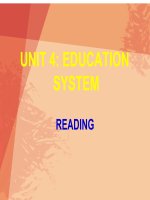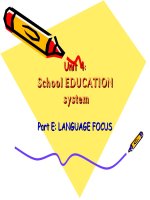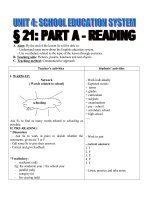UNIT 4- SCHOOL EDUCATION SYSTEM
Bạn đang xem bản rút gọn của tài liệu. Xem và tải ngay bản đầy đủ của tài liệu tại đây (485.31 KB, 12 trang )
A. Aims: By the end of the lesson Ss will be able to:
- Understand some more about the English education system.
- Use vocabulary related to the topic of the lesson through exercises.
B. Teaching aids: Pictures, posters, handouts and real objects
C. Teaching method: Communicative approach
Teacher’s activities Students’ activities
I. WARM-UP:
Network
( Words related to school)
Ask Ss to find as many words related to schooling as
possible.
II. PRE-READING:
* Discussion
- Ask Ss to work in pairs to decide whether the
statements given are T or F .
- Call some Ss to give their answers.
- Correct and give feedback.
*Vocabulary:
- academic (adj)
Eg: the academic year = the school year
- parallel (adj)
- category (n)
- fee- paying (adj)
- Work individually
- Expected words :
+ terms
+ grades
+ curriculum
+ subjects
+ examinations
+ pre – school
+ secondary school
+ high school
......
- Work in pair
- correct answers:
1. T
2. F
3. T
4. F
5. T
- Listen, practice and take notes.
schooling
- curriculum (n)
curricula (plural)
- core (n) = central or most important part
* Lead-in:
2, WHILE-READING:
Ask Ss to read the text and do the tasks.
Task1 .Find words or phrases meaning
- Ask Ss to read the passage again to find out the words
or phrases.
- Have Ss compare their answers with partners .
- Call some Ss to write the words or phrases on the board
to check.
- Correct and give feedback.
Task 2. Answer the questions.
- Check if Ss can answer the comprehension Qs without
reading the text again. If Ss cannot, get them to read the
Qs carefully and underline the key words to do the task.
- Get Ss to check theirs answers with their friends.
- Call some Ss to read theirs answers and explain their
choices.
- Comment and gives feedbacks.
3, POST-READING: Pairwork.
- Show the cues on the board and ask Ss, in pairs, to make
a complete conversation.
A B
1. May/ ask/ questions/? Yes
2. You/ have difficulty/
studying /?/ Yes
3. Which school subjects/ you
think/ the most difficult/?/ ( English)
- Individually read the passage to find out
the words or phrases
Correct answers:
1. state schools
2. primary education
3. secondary education
4. compulsory
5. The General Certificate of Secondary
Education
6. curriculum (n)
- Read the passage and answer the
questions
1. From the age of 5
2. 3 terms
3. The state school and the “
independent” or “public” school systems
4. Yes, they do.
5. There are 3 core subjects ( English,
Maths, Science)
6. They can take an examination called
the General Certificate of Secondary
Education
- Work in pairs.
Model:
A: - May I ask you some questions ?
B: -Yes, of course. What do you want to
know ?
A:Do you have any difficulties studying ?
B: Yes, What about you ?
A: I find it difficult to study social
subjects Which subjects do you think the
most difficult ?
B: - Oh, English of course.
Kinds of
school in
Vietnam
4.What/ you/ do / improve /it/ ?/ practice every
day/take part
in English club/
ask teacher/
friends to help
5. your English
be better/ now Thanks
- Modal with a good student if necessary.
- Ask Ss to work in pairs
- Go around for help
- Call some pairs to present in front of the class.
- Give comments .
III. Consolidation & Homework.
- Review main points of the lesson.
- Ask Ss to learn vocabulary
- Prepare section B
A: - What do you do to improve it?
B: - I practice English every day, speak
as regularly as possible. I also take part in
the English club in our school. If I have
any problems , I ask my teacher and
friends to help. They are always willing
to help me.
A: - I think your English is better now.
B: - Thanks.
- Learn vocabulary
- Prepare section B
A. Aims: By the end of the lesson, the students will be able to:
- Talk about the school education system in Vietnam.
- Talk about the similarities and differences between the school system in Vietnam and in
England.
B. Methods: Communicative approach
C. Teaching aids : Textbook, posters….
Teacher’s activities Students’ activities
I. Warm – up:
Network
- Ask Ss to find the kinds of school in Vietnam
- Work individually
Expected answers
1. nursery,
1 2
6 3
5 4
-Ask Ss to put these names in the right order from low to
high
- “What do you know about the school education
systems in Vietnam?”
- Introduce the new lesson
2. kindergarten,
3. primary school,
4. secondary school,
5.college,
6. university
II. PRE-READING:
-Ask Ss to study the table in task 1 then find out the new words
-Help Ss with the vocabulary and pronunciation
* GCSE: General Certificate of Secondary Education
- Elicit some useful expressions:
+ When do children in Vietnam go to lower school ?
+ How old are children when they first go to school?
+ How long is the primary school?
+ Do all children have go to nursery?
- Read the model conservation then call on some students to read
aloud it.
2. While – speaking
Task 2 Talk about the school education system
- Ask Ss to work in groups. -Goes around the class and give help if
necessary
- Call on some pairs practice in front of the class
- Correct Ss’ mistakes and Give feed back
1. In Vietnam, children can go to the nursery when they are only 3
or 4 years old.
2. After nursery, they go to kindergarten and stay there until they
are 5.
3. At the age of 6they move to primary school. All primary schools
in Vietnam are coed – male and female students together in the
same class room. It take them 7 years to finish high school.
Children leave high school at the age of 17.
4. They prepare for their higher study at colleges or universities.
Task 3: Talk about the similarities and differences between the
- Work in pairs.
Answers
- When do children in Vietnam go to
lower secondary education?
When they are 6.
- How long does the lower secondary
education last? Four years.
- Is pre –school compulsory in VN?
No, it’s optional.
- From which grade to which grade
does the upper education last ?
- From 10 to 12 .
- Listen.
- Group works.
- Work in groups.
school systems in Vietnam and England.
- Ask Ss to work in groups and compare
- Call on some Ss to present their answers.
- Give comments and feedback.
Differences:
In Vietnam In England
- Start primary school at the
age of 6 and finish at 10
-School is compulsory until
the age of 14
- Subjects studied
- Start primary school at 5 and
finish at 10
- School is compulsory until
the age of 16
....................
III. Consolidation & Homework:
- Ask Ss to prepare for part C
suggested answers:
Similarities:
-Both countries have to follow the
national curriculum set by the
government
-After secondary schools, Ss all have
to take the national examination
known as GCSE
.............................................
- Do the exercises again.
- Prepare for part C
Unit 4: school education system
A. Aims: By the end of the lesson, the students will be able to:
- Get information from conversation Jenny and Gavin about their studying at school.
- Improve their listening skills.
- understand the ways of making apologies.
B. Methods: T - T; S - S
pairwork, individual work, whole class
Communicative approach
C. Teaching aids : Textbook, posters….
Teacher’s activities Students’ activities
I. WARM-UP (5'):
Finding words
- Ask Ss to work in groups of 4, writing down things that they
do in school days.
- Call some Ss to write on the board.
- Correct and gives comments.
- Work in groups.
Expected words:
- doing exercises
- learning lessons
- taking tests, exams
- wearing uniform
- obeying school rules
- making friends









